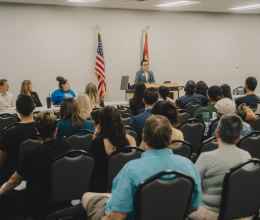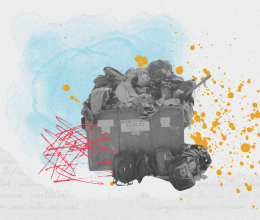FOR IMMEDIATE RELEASE
TUCSON—Today, a federal judge heard closing arguments in Doe v. Wolf, a lawsuit filed by the ACLU of Arizona, the American Immigration Council, the National Immigration Law Center, the Lawyers’ Committee for Civil Rights of the San Francisco Bay Area, and law firm Morrison & Foerster LLP.
The lawsuit, filed in 2015, seeks a permanent remedy to the inhumane conditions in U.S. Border Patrol detention centers in Arizona’s Tucson Sector. Evidence gathered in the case revealed cold and overcrowded conditions where there was no access to beds and limited access to soap, showers, adequate meals, and medical care.
During the course of the trial, a federal judge heard from qualified experts who testified on the inadequate medical care and severe conditions inside CBP detention centers. Another witness summarized government data that showed detention in these facilities are intended only for short-term confinement. The judge also heard from two witnesses previously held in Tucson Sector facilities. One witness described very cold and filthy conditions and alleged she was not provided with any personal hygiene items or received any medical attention to an infected wound. She also described receiving a burrito that looked green and was past its expiration date. Another witness described inadequate medical care for her high-risk pregnancy and cells so overcrowded that she was forced to sleep on the floor next to a bathroom stall. She recounted the trouble she had moving around to get to the toilet to vomit.
“This case is about the dignity we provide to vulnerable men, women, and children seeking safety,” said Alessandra Navidad, executive director for the ACLU of Arizona. “We hope the court remedies Border Patrol’s harsh treatment of migrants and that those detained in the future are granted the humane treatment the constitution provides them.”
“Very few facts were in dispute at trial,” said Colette Reiner Mayer, trial counsel from Morrison & Foerster. “It was undisputed that although these facilities were designed for short-term detention, they are now routinely used to hold detainees for more than 72 hours. Likewise, there was no dispute that detainees are forced to sleep on the floor and are provided nothing for warmth but a thin mylar blanket. We are happy to be one step closer to ending the unconstitutional conditions in the Border Patrol’s hold rooms.”
“At trial, Plaintiffs’ case revealed a systemic problem that’s been allowed to persist for far too long,” said Karolina Walters, staff attorney at the American Immigration Council. “Now that the court has all the facts and heard the arguments, we hope for a permanent remedy that will build upon the court’s earlier findings, ensure humane conditions in the Tucson Sector, and serve as an example for other CBP facilities.”
“This trial has made clear what we already knew: that CBP cannot justify the disgusting and dehumanizing conditions to which it subjects immigrants in its custody,” said Bree Bernwanger, senior staff attorney at the Lawyers’ Committee for Civil Rights of the San Francisco Bay Area. “Our clients testified that they spent days in CBP custody with nowhere to sit or lie but on the floor in the doorway to a bathroom, that they vomited continuously without receiving medical attention, and that they spent night after night in freezing hold rooms, shivering and unable to sleep. These conditions are as senseless as they are harmful. We hope that this trial will lead to a permanent solution that brings the agency into compliance with the Constitution and guarantees humane treatment for our clients.”
“At the heart of this matter are issues of basic human dignity,” said Alvaro Huerta, staff attorney at the National Immigration Law Center. “As the judge aptly reminded the courtroom at the outset of this trial, this case is fundamentally about how we, as a country, treat people and what consequences that treatment has in their lives. We stand firmly in our belief that all people should be treated humanely and with dignity, and not detained in conditions that put their health and safety at risk.”
Immigration attorneys involved in the case held a telephonic press briefing following the trial, where they spoke on the inadequate medical care and severe conditions inside CBP detention centers. A recording of the briefing is available here: LINK.
###






